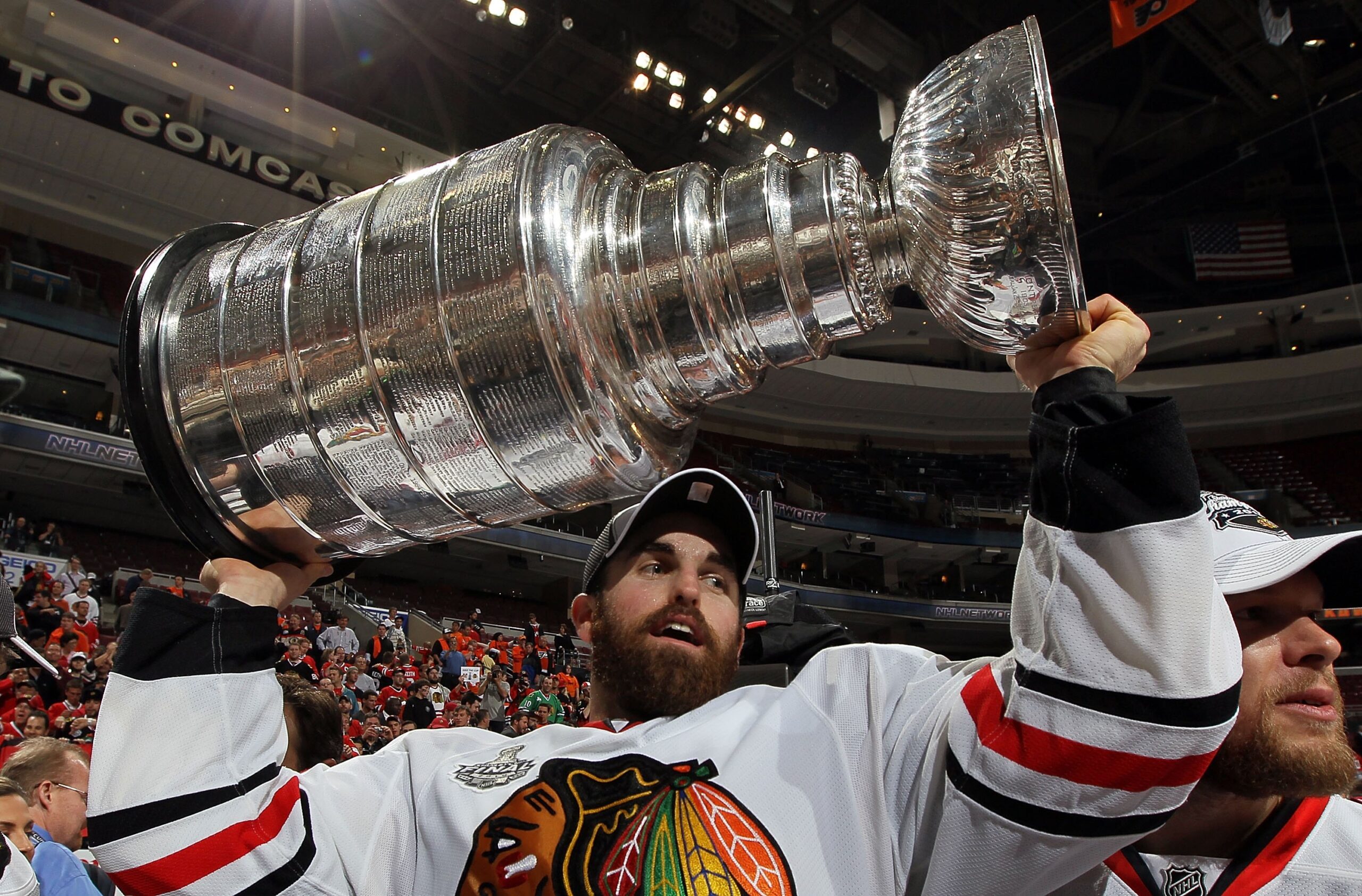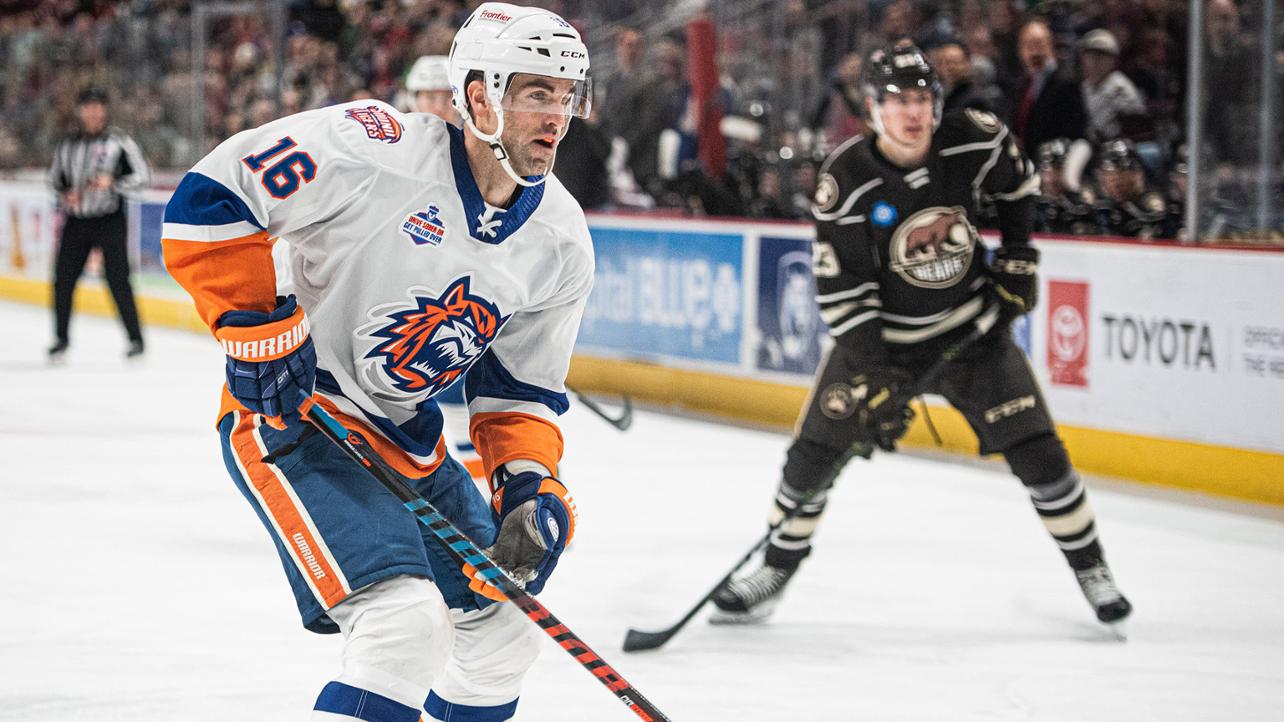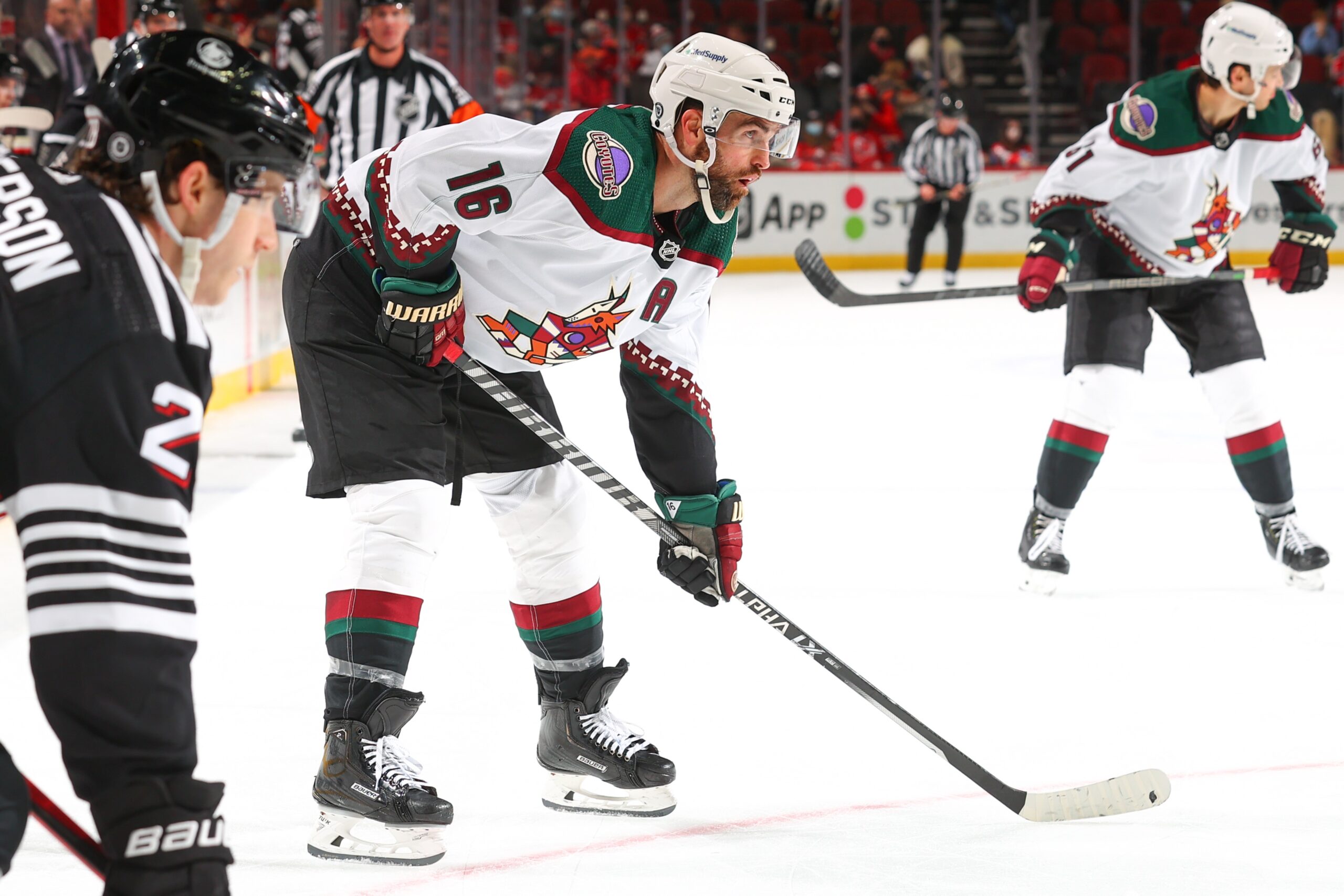© 2025 ALLCITY Network Inc.
All rights reserved.

When Andrew Ladd faces the New York Islanders on Friday night, he won’t be skating in either of the arenas that the Islanders called home while he played for them from 2016-2020. The Islanders left Barclays Center in Brooklyn, and 50-year-old Nassau Veterans Memorial Coliseum in Uniondale to move into the newly built UBS Arena in Elmont in late November.
“It’s kind of weird because normally you go back and see the old rink; all the things that you knew and came to expect,” Ladd said.
That expectation also applies to Ladd’s return. Few who watched injuries and age limit Ladd to 30 NHL games over the past three seasons (and four over the past two) will recognize the player who is wearing an A as a Coyotes alternate captain while logging more average ice time than he has since the 2017-18 season.
“When he came here, we told him he would have an opportunity to play and I could see in his eyes that he was wondering if that was true because he’s probably been told a lot of stuff in his career,” Coyotes coach André Tourigny said. “A lot of people could have quit in the same kind of situation he was in; kind of moved on. Instead, he took that time as an opportunity to grow his game, and at his age (36). That taught me a lot. I have learned that he is driven, he has a chip on his shoulder and he has a lot of character. He earned my respect.”

The long fall from grace
Ladd’s NHL career got off to a storybook start. In his rookie season, he played a meaningful role in Carolina’s 2006 run to the Stanley Cup. When the Hurricanes traded him to Chicago in 2008, he helped the Blackhawks end a 49-year Cup drought in 2010.
Mismanagement and cap constraints forced the Blackhawks to trade him to Atlanta after that season, Atlanta moved to Winnipeg and Ladd became the Jets captain, helping Winnipeg earn its first playoff berth with a career-high 62 points in 2014-15.
When the Blackhawks brought him back at the 2016 trade deadline with the hope of making another Cup run, his career took a sharp turn south. The Blackhawks lost in the first round, Ladd signed a seven-year, $38.5 million contract with the Islanders, his production declined, and early in the 2018-19 season he suffered a meniscus tear. He rehabbed for three months, returned for 10 games, and got hit on the same knee (left), causing an ACL tear, an MCL tear and another torn meniscus.
“There is a mental toll that it takes on you, having to get back into rehab mode again and stay determined to do everything you can to put yourself in the position to even have a chance to come back and resume your career,” Ladd said. “But when I came back and they told me, ‘You don’t look good, you don’t look as quick or you’re not what we need,’ that’s not an easy thing to hear when you’ve been in the league for that long, playing at a high level, and have been a big part of a few teams.”
The Islanders assigned Ladd to their AHL affiliate in Bridgeport, Connecticut. Ladd said he did not handle the assignment or the Islanders’ assessment well at first.
“I had a habit of just closing off everybody,” he said. “I was super quiet. I would do my work, but my wife could see it and I’m sure my kids could feel it at home.
“I probably don’t have the most joyful disposition at the best of times; a little bit of resting bitch face. Most people are like, ‘Hey, man, you’re hard to read.’ Once people get to know me, they quickly realize that’s not me, but I think being like that has a tendency to keep people thinking, ‘This guy’s pissed off’ or ‘Something’s going on there.’ You leave it up to interpretation when that’s really not what’s going on.”
After weeks of watching him stew, Ladd’s wife Brandy suggested that he talk to someone. A teammate with whom he rode to Bridgeport games and practices had been speaking with mental skills coach Dan Leffelaar and suggested that Ladd do the same.

Old dog, new tricks
“I could feel that I wasn’t mentally in the place I needed to be and should talk to someone so I opened up about what I was feeling and maybe the unhealthy habits that I had that weren’t contributing to me enjoying my life, my family, my kids, the different aspects of my life,” Ladd said.
“I had a bad habit of kicking the crap out of myself for mistakes or when things went wrong. As hockey players, we’re probably not alone in this but we have a tendency to be the hardest on ourselves, to beat ourselves up. I just kind of had a tendency to internalize and keep everything bottled up. Anyone who’s gone through anything hard knows that’s just such an unhealthy way to deal with those issues, so we started talking about: How can I control the situation and not let the situation control me? For me, it was a huge learning experience.”
At the same time, Ladd began working with Hall of Famer turned skills coach Adam Oates, who runs the Oates Sports Group. The two worked on Ladd’s skating, controlling the puck and moving more freely on the ice, but the lessons got far more granular and eye-opening.
“One day, he’s like, ‘Hey, push off your one foot and then lift your knee, and then do the same with the other,’” Ladd said. “My right side was fine and then when we went to do it on my left side, I could not push off my left side and then lift my knee. It was just like a block.”
The block, whether physical or mental, was a result of Ladd’s injury and surgery.
“When a pitcher gets Tommy John surgery, they have to retrain the mechanics of throwing the ball,” Oates said. “When you have a major injury, you have to retrain the mechanics of skating, and how that intertwines with your hockey stick and with your hands. It’s a complicated process; hockey rehab if you will.”
Oates has made this his professional mission for the past seven years.
“Some of the knowledge I have comes from experience, some of it comes from injuries and some of it comes from the fact that since I retired, I’ve spent a lot of time trying to research the human body for myself and for others,” Oates said.
“I try to get a player to be spontaneous. We’re not telling him how to play because he kind of already knows that. We’re trying to give him every possibility. Some guys don’t move to their left too good so we work on how to move left. The number one thing in our game is the concussions. A guy bobbles the puck, he gets hit, he gets a concussion. So we work on how to stop bobbling the puck. Essentially, you accentuate what a player does well, and you try to go about fixing the glitches.”
Oates said that Ladd was a willing and eager student; “an absolute pro.” Ladd said that Oates’ teachings produced results. That, in turn, made him willing and eager.
“I skated by myself for the majority of last year,” Ladd said. “Anyone who has skated by themselves for an extended period of time can tell you it’s not a whole lot of fun, especially without knowing if it’s ever going to change. You kind of feel like you’re alone on an island. I didn’t feel like I was a part of the organization with the Islanders and I wasn’t even playing in the AHL at that point.
“I’ve seen this through the pandemic, the effect that it can have on you when you’re isolated from people. I was going through the pandemic and also being isolated from people at work, so having some guidance in terms of what I could work on to get better while I was on the ice gave me kind of a purpose instead of just getting out there and doing drills for the purpose of doing drills. It was intentional. And then when you can tangibly feel the results on the ice, you want more.”

A return to NHL legitimacy
Ladd hasn’t lit the league on fire since he became a regular in the Coyotes lineup after some early scratches. He has five goals and eight points in 30 games, but production isn’t his primary purpose.
GM Bill Armstrong wanted plenty of veteran leadership to guide the Coyotes through this extended rebuild and Tourigny said that Ladd has grown into that role.
“You don’t arrive somewhere where you’re new and impose yourself,” Tourigny said. “You make your place on the team and slowly you earn the respect of your teammates and then more and more, your leadership grows. That’s exactly what Ladder did. He’s a really good model, not just for our young players, but our young leaders; our players of tomorrow who will take charge of our room. He’s incredible in that sense.”
Ladd has also embraced a depth role that carries different assignments than he had for the first decade of his career.
“(Wednesday’s game against New Jersey) was a good example,” Tourgny said. “Their first line was buzzing. In the first period, we could not handle them. Ladder was part of the line who played against them. From the moment I started to match them, it really settled our game and we were much better.”
“On top of that, Ladder makes plays with the puck, he brings toughness and he has good hockey sense. He’s helping our team right now.”
In the wake of the past three years’ experiences, Ladd has started 1616.org, a youth program that aims to teach kids how to handle, embrace and overcome adversity early in their lives to set themselves up for success.
“Tying it to the story of what I went through and how that has impacted me, this is my vision in terms of trying to pay that forward and make our game better by being more intentional with how we approach the mental side of the game,” he said. “I think that’s something that we as parents and coaches and even teammates can do from a younger age.
“We want to give kids these tools at a young enough age so that when some adversity hits or things are inevitably going to challenge them in their lives, they’ll have a little bit of a foundation to deal with those, or to realize that if they have a conversation with someone, that can be super helpful with them getting through something difficult.”
Ladd doesn’t know what next year holds for him. He is only under contract for one more year and if he plays any professional games in 2022-23 while under his current contract, or if he retires before the season, the Coyotes will lose the conditional 2023 third-round pick that they acquired from New York.
“One of the biggest things I’ve learned over this process is to stay present and enjoy where you’re at and what you’re doing,” he said. “If you’re thinking about the past, you’re not present. If you’re thinking in the future, you’re not present.
“Whether it’s with this group, or with my family, I’m just enjoying the present. I think if I do that, then good things will follow.”
Ladd doesn’t care that the Islanders were willing to dump his salary along with a 2021 second-round selection (Janis Moser), the higher of New York’s two, 2022 second-round selections and the aforementioned conditional third-round pick in exchange for nothing more than future considerations, which means one dollar.
In 20 more games, Ladd will play his 1,000th NHL game; a feat that he wasn’t sure that he would achieve last season.
“It was pretty obvious after a while that the opportunity with the Islanders wasn’t gonna happen so the only other option was, ‘Can we get another shot somewhere else?’” he said. “At that point, I didn’t care whether it was a salary shed or not. I got a chance to play NHL hockey again. Any time you have a vision at the start of something, and then you can see that come to fruition, that’s the best feeling.”
Follow Craig Morgan on Twitter
Comments
Share your thoughts
Join the conversation



